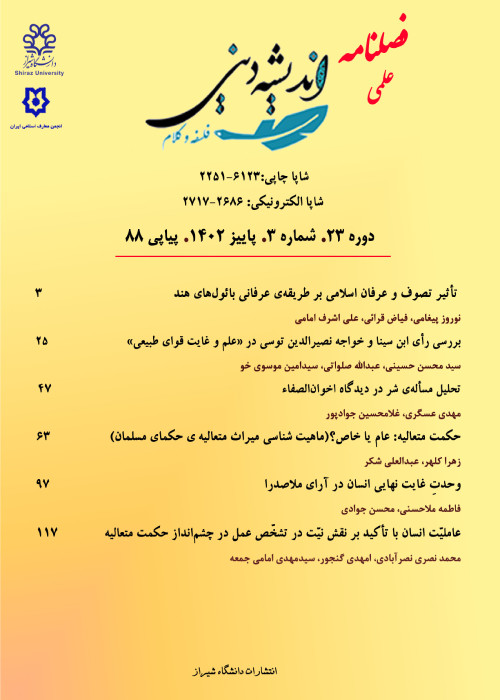Akrasia in Aristotle's Ethics
Author(s):
Abstract:
The gap between moral judgment and moral action, or in other words, “weakness of moral will” is a topic to which different ethical schools have paid attention. In Aristotle’s ethics, this topic developed under the title “Akrasia”, which is correspondent with Plato’s “Unity of Knowledge and Virtue”. In Aristotle’s ethical view, one can find a number of factors involved in the realization of the acts. While accepting the considerable impact of knowledge on moral action, Aristotle held that human beings, in spite of their clear knowledge, may act against their moral obligation; such a failure to act according to a sense of moral obligation originates from going after the desires provoked by the imagination of the soul susceptible to impiety. In such a case, the person who behaves immorally does so out of ignorance. Thus, the origin of moral weakness is the desire, which should be opposed so that the moral action could be fulfilled.
Language:
Persian
Published:
Journal of Religious Thought, Volume:9 Issue: 32, 2009
Pages:
1 to 28
magiran.com/p729074
دانلود و مطالعه متن این مقاله با یکی از روشهای زیر امکان پذیر است:
اشتراک شخصی
با عضویت و پرداخت آنلاین حق اشتراک یکساله به مبلغ 1,390,000ريال میتوانید 70 عنوان مطلب دانلود کنید!
اشتراک سازمانی
به کتابخانه دانشگاه یا محل کار خود پیشنهاد کنید تا اشتراک سازمانی این پایگاه را برای دسترسی نامحدود همه کاربران به متن مطالب تهیه نمایند!
توجه!
- حق عضویت دریافتی صرف حمایت از نشریات عضو و نگهداری، تکمیل و توسعه مگیران میشود.
- پرداخت حق اشتراک و دانلود مقالات اجازه بازنشر آن در سایر رسانههای چاپی و دیجیتال را به کاربر نمیدهد.
In order to view content subscription is required
Personal subscription
Subscribe magiran.com for 70 € euros via PayPal and download 70 articles during a year.
Organization subscription
Please contact us to subscribe your university or library for unlimited access!


